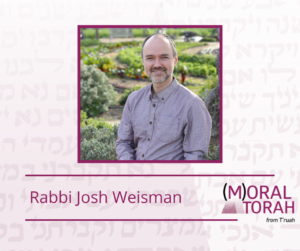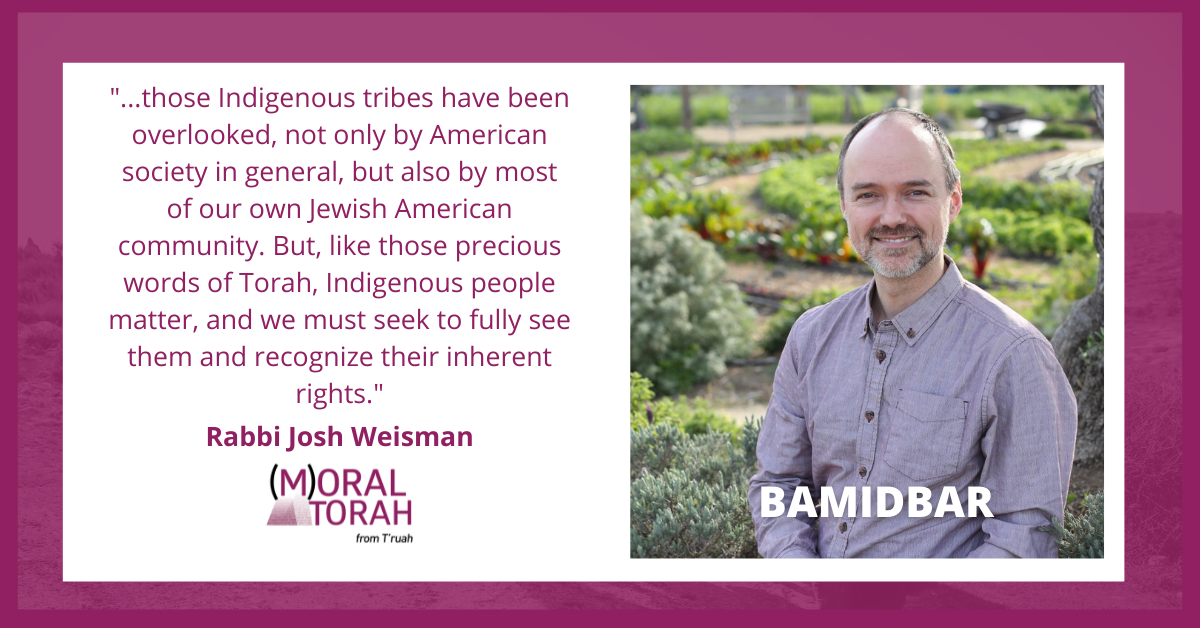A D’var Torah by Rabbi Josh Weisman for Parshat Bamidbar
What have we overlooked, and whom? Torah study — to which we recommit ourselves on Shavuot — demands that we search fearlessly for the meaning and value of every word, leaving no passage neglected. That requires a special kind of awareness, free of preconceived notions and habituated patterns of thought. That attitude is encapsulated in a pithy midrash on the first verse of this week’s parshah, Bamidbar: “‘God spoke to Moses in the Sinai Wilderness’ — Anyone who does not make themself ownerless like the wilderness cannot acquire the wisdom and the Torah.” (Bamidbar Rabbah 1:7) One way to understand this is that acquiring Torah requires a mindset free of the kind of mental blockages that can lead us to overlook the new or surprising, things that might be hard to find, or were merely hiding in plain sight. And what follows this first verse is precisely that: many verses that we habitually ignore — a tribe by tribe census of the Israelites. In fact, Bamidbar has more than one census, culminating in apportioning the land to those tribes.
But whether or not the Sinai wilderness was ever ownerless as the midrash suggests, in North America, the so-called wildernesses never have been. Those places — and indeed every square mile of North America — have always been, and continue to be, the home of specific tribes of Indigenous peoples. And those Indigenous tribes have been overlooked, not only by American society in general, but also by most of our own Jewish American community. But, like those precious words of Torah, Indigenous people matter, and we must seek to fully see them and recognize their inherent rights.
Sign up to receive (M)oral Torah in your inbox each week.
This year, we are fortunately seeing more attention to the rights of Native Americans than ever before, and it’s time for that awareness to permeate the American Jewish community. A wave of momentum seems to be building around various efforts by and for Indigenous people and their rights, including the Land Back movement, land taxes paid to tribes, land acknowledgements, and calls for more investment in Native sovereignty and wellbeing. The confirmation of Deb Haaland as Secretary of the Interior — the first Native American to be a cabinet secretary — has added to the sense that a historic tide is turning.
But why have most of us as American Jews paid so little attention to Native Americans? A couple of reasons seem likely. Geography — or geographic perception — is one: We tend to be urban, and while there are many urban Native Americans, we often think of Native American communities as being located on rural reservations. The perception of relative numbers is another — there are fewer Native Americans than there are white, Black, Latino, and Asian Americans. Here, however, we Jews should really know better! We are also a small minority by number, but if we think that our needs and rights should be respected as a minority, the same should be true for Native Americans. Indeed, Ojibwe author David Treuer recently noted that the number of Native Americans is about the same as the number of Jewish Americans! (Read his powerful new article chronicling the history of misappropriation of Native American land in the creation of national parks and calling for the return of those lands to Indigenous sovereignty.) The implication is that since we all know Jewish Americans matter despite relatively small numbers, Native Americans should, too! We should take this honor and return the favor. Whatever the reasons might be, we must stop ignoring Native Americans because justice is at stake: America is built on the erasure – literal and otherwise – of Native Americans, and we should not participate in that systemic injustice by ignoring them ourselves.
Find more commentaries on Bamidbar.
Living in Washington State for the past three years has disabused me of these geographic and demographic misconceptions. Tribal nations are everywhere here, packed in between and adjacent to the major urban centers where most Jews live. You can’t drive between any two cities here on the main interstate without passing through multiple reservations. Additionally, many Native Americans live off reservation, in the same cities where Jewish communities are located. And, perhaps most importantly, more than anywhere else I’ve lived, there are numerous Indigenous Jews here, from State Supreme Court Justice Raquel Montoya-Lewis, to leaders in the Jewish communities I’ve served. (That has led to some preliminary solidarity, as when my students at Hillel UW and I organized a Big Bold Jewish Climate Fest event around the Puyallup Tribe’s fight against a fracked gas plant on their reservation’s waterfront, featuring one of those Native Jewish leaders, treaty rights lawyer Jeremy Wood.) But we shouldn’t need numbers to remind us of the importance of Native Americans, Jewish or not. Wherever we live in North America — from Manhattan or Monsey to Tucson, Miami to Seattle — it is on stolen Indigenous land, often with an Indigenous place name (as all five of those places have).  And so, wherever we are, there are opportunities to acknowledge their inherent rights to this land and support their sovereignty.
And so, wherever we are, there are opportunities to acknowledge their inherent rights to this land and support their sovereignty.
We have been a tribal people, too, as this week’s parshah reminds us in great detail. We may tend to overlook the tribal lineages that Torah so lovingly enumerates again and again, and the local place names that pepper our Bible, as just so much remote and ancient trivia. But we do our own self-understanding, and our commitment to justice for all Americans, a disservice when we overlook the names, places, and especially people that have been here all along.
Rabbi Josh Weisman is the Senior Jewish Educator at University of Washington Hillel in Seattle.

